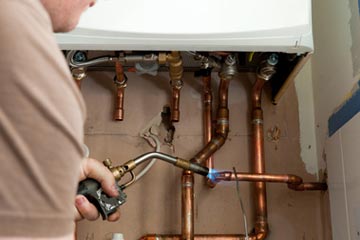Guide to Tankless Water Heaters

Water heaters have changed significantly over the past decade. While the bulky, traditional style water heaters remain available; there are now smaller, more efficient tankless water heaters on the market.
What should consumers know about tankless water heaters? This guide to tankless water heaters answers many consumer questions.
What is a tankless water heater? Conventional water heaters store and continuously heat large quantities of water for consumer use on-demand. A tankless water heater has no storage tank as its name implies. It uses gas or electricity to heat needed water in short bursts throughout the home.
Consumer Benefits of Tankless Water Heaters
Tankless water heaters require less energy than conventional water heaters. Tankless water heaters work on-demand--warming water for use only as it is needed. In some homes, this on-demand heating cuts the water heating bill by up to 20 percent.

Tankless water heaters are smaller than traditional water heaters. Even the larger, tankless water heaters designed to supply heated water to the entire home are smaller than the bulky, conventional, water heaters that consume the space of utility rooms and basement corners. The design of small tankless water heaters, located throughout the home, allows them to sit beneath a sink or in a closet close to the locations requiring heated water.
Tankless water heaters work alone or with conventional water heaters. Traditional water heaters have limited storage capacity. This often creates problems for large families using larger quantities of water throughout the home at the same time. Adding a tankless water heater helps supplement the water available from traditional means--even if the original water heater is still in good condition.
Tankless water heaters are available in either gas or electric models. Depending on the household needs, consumers have the option of either gas or electric powered models, making it easier to locate the tankless water heater or heaters efficiently throughout the home.
Tankless water heaters waste less water than traditional models. Since the hot water supplied by tankless water heaters is immediate; consumers are not as likely to run water while waiting for it to warm.

Tankless water heaters last longer than traditional. The functional life of a tankless water heater is approximately 20 years while conventional water heaters typically last about 13 years.
Electric Tankless Water Heater vs. Gas Tankless Water Heater
Large, gas powered models supply about five gallons of heated water per minute. Similar electric models produce two gallons of heated water at lower heated temperatures than gas models. Electric units require large, immediate power supplies--and may require updated home wiring for adequate safety and performance. Electric models cost more to operate--but, gas models with pilot lights tend to waste energy since the pilot light must remain lit for operation.
Tankless Water Heaters Brands
Well known companies such as GE, Rheem, Kenmore, and Whirlpool offer various tankless water heater options in a variety of styles and capacities.

Tankless Water Heater Reviews
Reviews for tankless water heaters are readily available online through consumer research sites, home improvement stores, and directly from manufacturer websites. Since there are pros and cons for both gas and electric powered models and capacity considerations, each consumer situation is different and a variety of reviews necessary for making informed decisions.
Hiring a Plumber to Install Your Tankless Water Heater
When replacing a traditional water heater with a tankless version, hiring a licensed plumber for installation prevents a lot of potential safety and functionality risks. While the actual installation seems straightforward, considerations such as proper venting and pipe fitting for gas models and electrical wiring concerns for electric models offer a lot of room for error. Hiring a licensed plumber for the installation may save a lot of time and money in the long run.